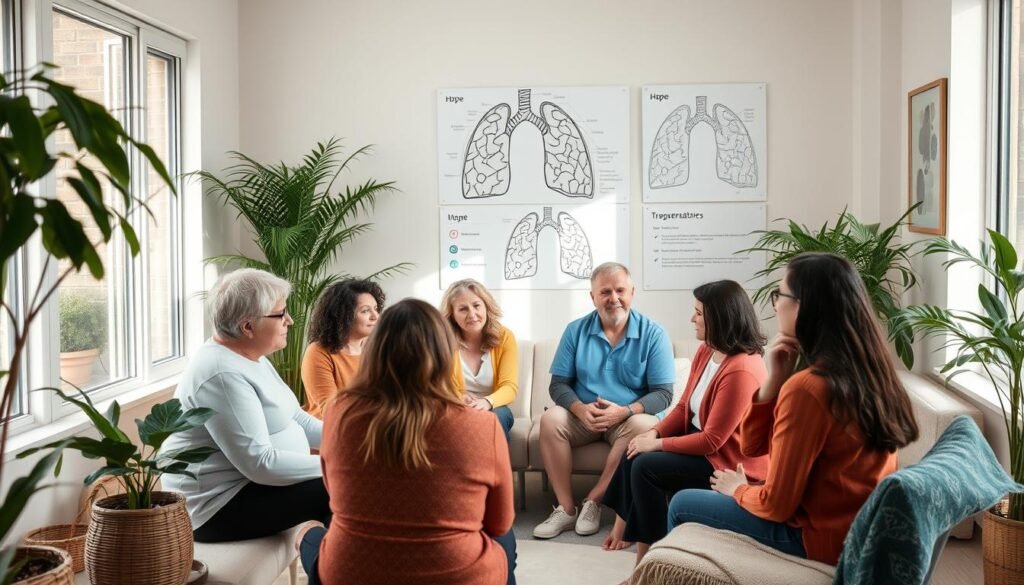Did you know about 1.6 million patients are diagnosed with lung cancer every year? This large number shows how important it is to make life better for people with advanced lung cancer. Especially those at stage 4, where the cancer has spread. Lung cancer causes a lot of deaths—nearly 1.3 million each year. So, it’s clear we need to improve patients’ lives.
Dealing with stage 4 lung cancer is very hard. It can make patients’ lives much worse, both physically and emotionally. Health care workers should aim to make their lives better. They need to offer good treatments and caring support. This support should tackle the many problems these patients face. Doing this can make their lives more bearable and meaningful, even with this tough disease.
For more on treating advanced lung cancer and making lives better, check out this expert guide.
Key Takeaways
- Approximately 1.6 million new lung cancer cases are diagnosed each year.
- Quality of life is severely affected, particularly in late-stage lung cancer patients.
- Effective palliative care can substantially improve the overall well-being of patients.
- Support systems play a vital role in enhancing the quality of life in cancer patients.
- Personalized treatment plans are crucial for addressing individual patient needs.
- Understanding common symptoms can aid in managing the challenges faced by patients.
Understanding Stage 4 Lung Cancer
Stage 4 lung cancer is the most severe stage of the disease. It has spread to distant organs, including both lungs and nearby areas. This stage is challenging because diagnosis often comes late, lacking early symptoms.
Non-small cell lung cancer (NSCLC) accounts for most cases, 80–85%. Small cell lung cancer (SCLC) is less common, making up about 10–15%. Survival rates for stage 4 lung cancer vary greatly. For example, only 8% of metastatic NSCLC patients survive five years. Those with regional spread have a 37% survival rate. In contrast, stage 4 SCLC patients face a survival rate of only 3% for widespread disease.
Many factors affect survival rates in advanced lung cancer. Age plays a role, with older patients often faring worse. Gender also influences outcomes, as studies show women tend to live longer after diagnosis than men. Genetic mutations and tumor biology are critical in treatment response. This highlights the need for personalized treatment approaches.
Knowing about stage 4 lung cancer is essential for patient care. It helps choose the right treatment options. For more information on survival rates, visit lung cancer survival rate information.
| Lung Cancer Type | Stage 4 Survival Rate | Metastatic Spread |
|---|---|---|
| Non-Small Cell Lung Cancer | 8% | Widespread (distant) |
| Non-Small Cell Lung Cancer | 37% | Regional |
| Small Cell Lung Cancer | 3% | Widespread (distant) |
| Small Cell Lung Cancer | 18% | Regional |
The Importance of Quality of Life in Stage 4 Lung Cancer
Quality of life is crucial in treating late-stage lung cancer patients. It includes physical, mental, and social areas, impacting overall well-being. A study with 135 patients showed many face psychological distress during chemotherapy. It underlines the need for a broad approach to valuing life quality in lung cancer care.
About one-third of patients feel depressed before starting treatment. This feeling often continues even after treatment begins. Highlighting the importance of care that enhances life quality is essential. Supportive care helps patients remain independent and active. Tailoring care to individual needs and goals is key.
The study found that the average physical health score was 38.17, with a mental health score of 45.63. It shows that factors like fatigue affect patients’ life quality greatly. Early palliative care improves life quality and mood, making it crucial for comprehensive treatment plans.
Improving life for patients goes beyond treating health issues directly. It’s about creating a caring and supportive environment. By acknowledging each patient’s unique situation, we can vastly better the lives of those with stage 4 lung cancer.
Common Symptoms Affecting Quality of Life
People with stage 4 lung cancer face many challenges that impact their life quality. It’s important to know common symptoms for patients and caregivers. Fatigue, breathing problems, and mental health issues like anxiety and depression are key issues. Helping with these problems is crucial for improving life quality.
Fatigue and Its Impact
Fatigue is a major symptom for those with stage 4 lung cancer. It makes everyday tasks very hard. Handling fatigue involves rest, eating well, and trying to stay active. Emotional issues like anxiety at the start can make fatigue worse. It’s vital to look at this when caring for patients.
Respiratory Problems and Breathlessness
Breathing issues often show up as a chronic cough and feeling out of breath. These problems can be scary and lead to less activity, harming health. Dealing with shortness of breath makes it hard to talk to people, making patients feel lonely during a tough period.
Psychological Effects: Anxiety and Depression
Lung cancer deeply affects patients’ mental health. About 43.4% of patients feel distressed, one of the highest rates in cancer. Younger patients and those who work may feel more burdened mentally. Mental health care is key since more emotional problems can lower life quality and add to symptoms. Support helps patients deal with their situation better, enhancing their recovery atmosphere.
| Symptoms | Impacts | Management Strategies |
|---|---|---|
| Fatigue | Limits daily activities | Rest and balanced nutrition |
| Respiratory Problems | Causes physical distress | Breathing exercises and pulmonary rehab |
| Anxiety and Depression | Reduces quality of life | Counseling and support groups |
Palliative Care: A Key Component of Treatment
Palliative care is vital for people with stage 4 lung cancer. They often face tough symptoms like pain, shortness of breath, and fatigue. The goal of palliative care is to ease these symptoms. It improves life quality by offering care that meets individual needs.
A skilled team of doctors, nurses, and social workers delivers this care. They offer full support for both physical and emotional needs. Palliative care also improves communication about treatment choices. This helps patients and their families make better decisions.
There are many supportive care options for lung cancer:
- Procedures to open airways
- Pain medications
- Emotional support
- Nutritional supplements
- Integrative services like mindfulness and counseling
Palliative care is available in many places, including hospitals and homes. Some places have special centers for palliative care. Studies show starting palliative care early helps reduce symptoms. It also can improve survival rates and life quality.

Unfortunately, not all advanced lung cancer patients get outpatient palliative care. More care visits can help improve life quality and lessen depression. Early referrals to palliative care are crucial. They help patients understand their condition better and offer needed support during their cancer treatment journey.
Quality of Life in Stage 4 Lung Cancer: Assessment and Measurement
It’s really important to know how good the quality of life is for patients with stage 4 lung cancer. Experts use special tools like measuring quality of life in lung cancer to see what patients need most. The QLQ-C30 and QLQ-LC13 are questionnaires that help understand patients’ feelings and symptoms.
A study from 1997 to 2003 looked at 447 people who lived with lung cancer for a long time. Most of these survivors had surgery, and some also had radiation or chemotherapy. Sadly, 35% felt their quality of life got worse over time. Only 15% said it got better. Issues like tiredness, pain, trouble breathing, and not wanting to eat got worse for some.
Getting to know these personal stories is key to helping patients better. By assessing patient well-being, doctors can see changes and make better plans for treatment. Having friends and family support makes a big difference too. People with good support usually feel better about their quality of life. This shows how important it is to have caring people around during treatment.
| Factor | Increased Quality of Life | Decreased Quality of Life |
|---|---|---|
| Physical Symptoms | Milder Symptoms | Severe Symptoms |
| Smoking Status | Non-smoker | Current/Former Smoker |
| Palliative Care | Early Integration | Lack of Palliative Support |
| Social Support | Higher Levels | Social Isolation |
Strategies for Improving Quality of Life
To make life better for people with stage 4 lung cancer, a multi-layered plan is key. This plan focuses on both integrative services and proper nutrition. Challenges that patients face can be lessened with supportive care and choosing a healthy lifestyle. Integrative services help patients handle the mental stress of cancer.
Integrative Services: Mindfulness and Counseling
Mindfulness, like meditation and yoga, can really improve a person’s emotional health. Studies show that these practices help lower stress, anxiety, and sadness in those living with cancer. Counseling provides ways to manage tough emotions that come up during treatment. Participating in peer support groups lets patients find friendship and understanding from those in similar situations.
Nutrition and Weight Management
Good nutrition is very important for lung cancer patients. It helps with energy and fighting off sickness. Talking with a nutritionist can help patients find the best food choices for their needs. Keeping active helps reduce tiredness, improve happiness, and manage weight during treatment.
| Healthy Habits | Benefits |
|---|---|
| Stop Smoking | Improves lung function and overall health |
| Balanced Diet | Fosters strength and supports immune system |
| Regular Exercise | Reduces fatigue and improves mood |
| Mindfulness Practices | Helps decrease stress and anxiety |
| Counseling Support | Offers coping mechanisms and emotional assistance |
Focusing on these strategies helps create a caring space for patients. It builds their ability to cope and improve their life quality while undergoing treatment.
The Role of Support Systems
A strong support system is key for patients with stage 4 lung cancer. It includes emotional, practical, and financial help from loved ones and the community. This improves their quality of life. Talking about care with family and friends makes a big difference. It helps reduce the stress that comes with this serious illness.
Community support is also vital in lung cancer care. Support groups and community organizations provide a place to connect and share stories. This social support boosts the quality of life for those with cancer. It’s crucial for patients to seek out and keep these connections.
Support from family is especially important when dealing with terminal illness. Studies show that patients who feel supported by their family have better quality of life. This kind of support gives them strength and makes them feel safe in tough times.
| Support Type | Benefits | Examples |
|---|---|---|
| Emotional Support | Reduces anxiety and depression | Listening, companionship, encouragement |
| Practical Support | Assists with daily tasks | Cooking, transportation, medical appointments |
| Financial Support | Eases financial burden | Fundraising, aid from organizations |
Open communication in these support systems helps patients be more resilient. It improves their life quality. By building and keeping these networks strong, patients can better tackle lung cancer’s challenges.
Educating Patients and Families
Education is key in handling stage 4 lung cancer’s complexity. Teaching lung cancer patients helps them and their families make wise choices. Knowledge enhances patient-provider communication, creating a climate where treatment and symptoms can be discussed freely.
The Importance of Communication with Health Care Providers
Good talks between patients and health teams improve life quality and treatment success. Knowing their condition well, patients can share concerns and help shape their care. Family education in lung cancer care matters too since caregivers offer crucial support.
In a study, caregivers felt more stressed when patients’ lives were heavily impacted. But with education, families understood how to deal with cancer’s challenges better. Sessions lasting 31 to 44 minutes for patients and 25 to 35 for caregivers made a positive difference.
So, focusing on education can better patient well-being and lessen caregiver stress. Good patient-provider communication leads to better overall care. This improves life for those facing stage 4 lung cancer.

Available Therapies and Interventions
For patients with stage 4 lung cancer, many therapies and interventions can improve life quality. Medications are key, often given to help with lung cancer symptoms and bring notable relief. These drugs can ease pain, reduce nausea, and help with breathing issues tied to the disease’s advanced stage.
Medications for Symptom Relief
Different types of medications are used to handle lung cancer symptoms. Chemotherapy, for example, is common for non-small cell lung cancer (NSCLC). Drug combinations, such as cisplatin or carboplatin with gemcitabine or paclitaxel, are often employed. Targeted therapies, like erlotinib for those with EGFR mutations, are another option for improving life quality. It’s important to be aware and prepare for these drugs’ common side effects, like:
- Skin rash
- Diarrhea
- Nausea and vomiting
- Temporary hair loss
- Pneumonitis and colitis (from immunotherapy)
Complementary Therapies: Acupuncture and Massage
Alongside standard medications for lung cancer, complementary therapies such as acupuncture and massage significantly boost patient wellness. They aid in easing tension, enhancing blood flow, and provide relaxation, which improves both emotional and physical health. Adding these holistic methods forms a complete care plan that meets patients’ physical and emotional needs.
| Therapy Type | Purpose | Common Side Effects |
|---|---|---|
| Chemotherapy | Manage symptoms and slow progression | Nausea, temporary hair loss, neuropathy |
| Targeted Therapy | Treat specific mutations in tumors | Skin rash, diarrhea |
| Immunotherapy | Boost immune response against cancer | Skin reactions, colitis |
| Acupuncture | Alleviate pain and stress | Minimal, potential bruising |
| Massage | Reduce muscle tension and promote relaxation | Minimal, potential discomfort |
Managing Financial and Logistic Concerns
Many patients fighting stage 4 lung cancer face financial difficulties. A study showed that 30% struggle with money, affecting their care access. It’s vital to know about financial support for lung cancer patients, like treatment grants and insurance options.
Getting to medical appointments is also a big challenge. This can make following treatment plans hard. But, solving these logistical issues in cancer care can make a big difference. Support programs that offer rides help patients stick with their treatment.
The cost of treating lung cancer is often overwhelming. Financial worries don’t just affect the wallet. They can also hurt a patient’s mental health, causing anxiety and sadness. By helping with both money and travel needs, we can improve life quality for cancer patients during their tough journey.

Coping Mechanisms and Mental Health Support
Patients with stage 4 lung cancer need effective coping tools. These help keep their mental health strong. Mental health support can boost their emotions and make relationships with doctors and family better. Supports include groups and hobbies.
Social Support Groups
Social support groups offer a welcoming space for sharing stories and making friends with others in similar situations. They give a sense of belonging and understanding. This is key to fight the loneliness cancer patients often feel. Being part of a support system helps patients handle their cancer journey better. It makes their life quality better. Also, places like the Lung Cancer Survivors Community on Inspire are great for finding connection.
Engaging in Hobbies and Leisure Activities
Taking up hobbies benefits cancer patients greatly. Fun activities help distract from cancer’s stress and uncertainties. Coloring, meditating, or tai chi can relax and strengthen emotionally. Adding hobbies to daily life improves mental health, showing how beneficial they are. These activities bring happiness and a sense of normal life, easing mental strain.
Studies show that enjoying hobbies reduces anxiety and depression. Positive experiences build resilience, helping patients deal with emotional challenges of treatment. Combining social support with personal hobbies can greatly improve life quality during hard times.
For more details, check out the full study on coping methods and life quality here.
Conclusion
Improving life for stage 4 lung cancer patients is crucial. It involves tackling various challenges. We need to consider factors like their symptoms, mental health, and support networks. Using well-planned palliative care and strong communication strategies can make a big difference in their lives.
Patients with advanced lung cancer see their quality of life drop, especially in the last months. Studies show their quality of life score can fall from 58 to 38 as they near the end. It shows how critical it is for healthcare teams to offer care that addresses both the body and the soul.
By focusing on improving the quality of life for lung cancer patients, medical teams can help reduce suffering. They can help patients find peace and dignity in their final days. By improving and updating our care strategies, we make sure patient well-being is always the top priority in lung cancer treatment and support.